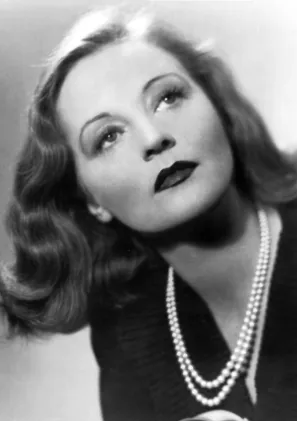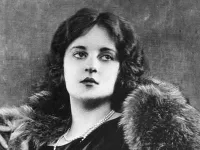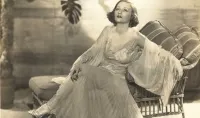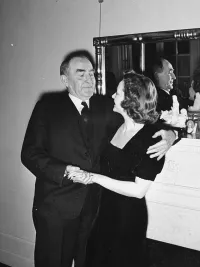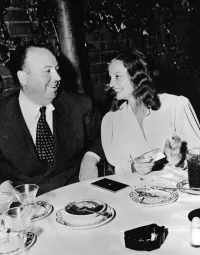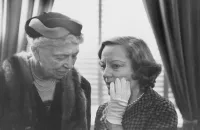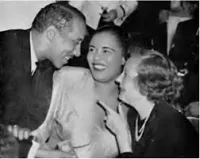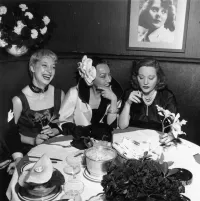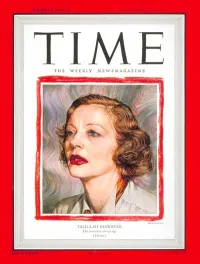Biography
1902 - 1968
“If I had to live my life again, I'd make the same mistakes, only sooner.”
– Tallulah Bankhead
Tallulah Bankhead was born the daughter of Congressman William Bankhead on January 31, 1902 in Huntsville, AL. Her mother died of sepsis soon after her birth and as a result Bankhead was raised by several relatives. After winning a beauty contest at 16, she headed to New York City and found stage work but little success. Shortly after arriving in New York City, Bankhead moved into the Algonquin Hotel and became a member of the famed Algonquin Round Table and was dubbed one of the “Four Riders of the Algonquin” alongside Estelle Winwood, Eva Le Gallienne, and Blyth Daly. In 1923 Bankhead went to England, quickly becoming the most popular actress of the West End, creating a sensation with her flamboyant personality and husky voice. In 1931 she returned to the United States with a Paramount contract, but despite roles in several movies, her film career fizzled. Bankhead then returned to the New York stage in such productions as Dark Victory, Rain, Reflected Glory, The Little Foxes, and Skin of Our Teeth. Romantically, Bankhead was linked to many men and women and jokingly referred to herself as “ambisextrous.” Notable lovers included Patsy Kelly, Billie Holiday, Alla Nazimova, Greta Garbo, Marlene Dietrich, Hattie McDaniel, Mercedes de Acosta, Beatrice Lillie, Barbara Stanwyck, Daly and Le Gallienne. She was married to actor John Emery from 1937-1941 and after the divorce bought a home in rural New York where the chain smoking, bourbon drinking, and very quotable Bankhead loved to shock others. Her routine behavior included greeting guests in the nude and hosting wild parties that lasted for days. She was quoted as saying, “Say anything about me, dahling, as long as it isn't boring.” After her triumphs on Broadway, she returned to film and starred with great success in Alfred Hitchcock's Lifeboat (1944) which led to her filming A Royal Scandal. In 1948 she returned to the stage with a huge hit, Noel Coward’s Private Lives, a part she played for two years. In the 1950s she began a radio show, hosted a television show, published her autobiography, appeared on shows like The Lucy-Desi Comedy Hour, had a Las Vegas nightclub act, and occasionally returned to the stage. Her last acting performance was as the Black Widow on Batman in 1967. Additionally, Bankhead was a social justice activist who opposed racism and segregation, supported foster children and helped families escape both the Spanish Civil War and World War II. A heavy smoker, Bankhead died in New York on December 12, 1968 at age 66 from double pneumonia arising from influenza, and complicated by emphysema.
1902 - 1968
“If I had to live my life again, I'd make the same mistakes, only sooner.”
– Tallulah Bankhead
Tallulah Bankhead was born the daughter of Congressman William Bankhead on January 31, 1902 in Huntsville, AL. Her mother died of sepsis soon after her birth and as a result Bankhead was raised by several relatives. After winning a beauty contest at 16, she headed to New York City and found stage work but little success. Shortly after arriving in New York City, Bankhead moved into the Algonquin Hotel and became a member of the famed Algonquin Round Table and was dubbed one of the “Four Riders of the Algonquin” alongside Estelle Winwood, Eva Le Gallienne, and Blyth Daly. In 1923 Bankhead went to England, quickly becoming the most popular actress of the West End, creating a sensation with her flamboyant personality and husky voice. In 1931 she returned to the United States with a Paramount contract, but despite roles in several movies, her film career fizzled. Bankhead then returned to the New York stage in such productions as Dark Victory, Rain, Reflected Glory, The Little Foxes, and Skin of Our Teeth. Romantically, Bankhead was linked to many men and women and jokingly referred to herself as “ambisextrous.” Notable lovers included Patsy Kelly, Billie Holiday, Alla Nazimova, Greta Garbo, Marlene Dietrich, Hattie McDaniel, Mercedes de Acosta, Beatrice Lillie, Barbara Stanwyck, Daly and Le Gallienne. She was married to actor John Emery from 1937-1941 and after the divorce bought a home in rural New York where the chain smoking, bourbon drinking, and very quotable Bankhead loved to shock others. Her routine behavior included greeting guests in the nude and hosting wild parties that lasted for days. She was quoted as saying, “Say anything about me, dahling, as long as it isn't boring.” After her triumphs on Broadway, she returned to film and starred with great success in Alfred Hitchcock's Lifeboat (1944) which led to her filming A Royal Scandal. In 1948 she returned to the stage with a huge hit, Noel Coward’s Private Lives, a part she played for two years. In the 1950s she began a radio show, hosted a television show, published her autobiography, appeared on shows like The Lucy-Desi Comedy Hour, had a Las Vegas nightclub act, and occasionally returned to the stage. Her last acting performance was as the Black Widow on Batman in 1967. Additionally, Bankhead was a social justice activist who opposed racism and segregation, supported foster children and helped families escape both the Spanish Civil War and World War II. A heavy smoker, Bankhead died in New York on December 12, 1968 at age 66 from double pneumonia arising from influenza, and complicated by emphysema.
Demography
Demography
Gender Female
Sexual Orientation Bisexual
Gender Identity Cisgender
Ethnicity Caucasian/White
Nations Affiliated United Kingdom United States
Era/Epoch Civil Rights Movement (1954-1968) Interwar Period (1918-1939) Jazz Age (1910-1940) Roaring Twenties (1920-1929) Second-wave Feminism (1960-1990) Spanish Civil War (1936-1939) World War II (1939-1945)
Field(s) of Contribution
Advocacy & Activism
Entertainer
Film
Radio
Social Justice
Television
Theater
US History
Commemorations & Honors
Named Among Ten Most Remarkable Women in London (1928)
Variety Award Best Actress of the Year For The Little Foxes (1939)
Variety Award Best Actress of the Year For The Skin of Our Teeth (1942)
New York Drama Critics Award for Best Actress in a Production For The Skin of Our Teeth (1942)
New York Film Critics Circle Award for Best Actress For Lifeboat (1944)
Radio's Woman of the Year (1950)
Hollywood Walk of Fame Star For Motion Pictures (1960)
Posthumous American Theater Hall of Fame Inductee (1972)
Posthumous Alabama Women's Hall of Fame Inductee (1981)
Demography
Gender Female
Sexual Orientation Bisexual
Gender Identity Cisgender
Ethnicity Caucasian/White
Nations Affiliated United Kingdom United States
Era/Epoch Civil Rights Movement (1954-1968) Interwar Period (1918-1939) Jazz Age (1910-1940) Roaring Twenties (1920-1929) Second-wave Feminism (1960-1990) Spanish Civil War (1936-1939) World War II (1939-1945)
Field(s) of Contribution
Advocacy & Activism
Entertainer
Film
Radio
Social Justice
Television
Theater
US History
Commemorations & Honors
Named Among Ten Most Remarkable Women in London (1928)
Variety Award Best Actress of the Year For The Little Foxes (1939)
Variety Award Best Actress of the Year For The Skin of Our Teeth (1942)
New York Drama Critics Award for Best Actress in a Production For The Skin of Our Teeth (1942)
New York Film Critics Circle Award for Best Actress For Lifeboat (1944)
Radio's Woman of the Year (1950)
Hollywood Walk of Fame Star For Motion Pictures (1960)
Posthumous American Theater Hall of Fame Inductee (1972)
Posthumous Alabama Women's Hall of Fame Inductee (1981)
Resources
Resources
Bankhead, Tallulah. Tallulah: My Autobiography. New York: Harper, 1952.
Bret, David. Tallulah Bankhead: A Scandalous Life. New York: Robson Books/Parkwest, 1996.
https://en.wikipedia.org/wiki/Tallulah_Bankhead
http://www.newworldencyclopedia.org/entry/Tallulah_Bankhead
http://womenshistory.about.com/od/actresses/p/tallulah.htm
http://www.imdb.com/name/nm0000845/bio?ref_=nm_ov_bio_sm
https://www.vanityfair.com/hollywood/2021/05/real-cruella-de-vil-tallulah-bankhead
Resources
Bankhead, Tallulah. Tallulah: My Autobiography. New York: Harper, 1952.
Bret, David. Tallulah Bankhead: A Scandalous Life. New York: Robson Books/Parkwest, 1996.
https://en.wikipedia.org/wiki/Tallulah_Bankhead
http://www.newworldencyclopedia.org/entry/Tallulah_Bankhead
http://womenshistory.about.com/od/actresses/p/tallulah.htm
http://www.imdb.com/name/nm0000845/bio?ref_=nm_ov_bio_sm
https://www.vanityfair.com/hollywood/2021/05/real-cruella-de-vil-tallulah-bankhead
